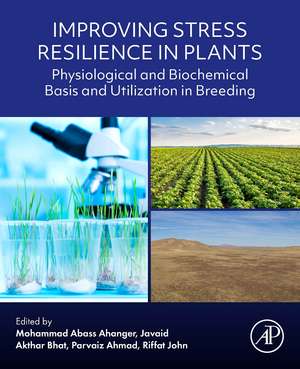Improving Stress Resilience in Plants: Physiological and Biochemical Basis and Utilization in Breeding
Editat de Mohammad Abass Ahanger, Javaid Akthar Bhat, Parvaiz Ahmad, Riffat Johnen Limba Engleză Paperback – 23 noi 2023
- Explores key strategies, including signaling molecules and Quantitative Trait Locus (QTLs)
- Highlights stress mitigating agents for improved crop yield
- Provides an integrated and holistic overview, enabling and inspiring further research toward improved food security
Preț: 909.37 lei
Preț vechi: 1185.82 lei
-23% Nou
Puncte Express: 1364
Preț estimativ în valută:
174.03€ • 188.97$ • 146.18£
174.03€ • 188.97$ • 146.18£
Carte tipărită la comandă
Livrare economică 15-29 aprilie
Livrare express 18-22 martie pentru 114.47 lei
Preluare comenzi: 021 569.72.76
Specificații
ISBN-13: 9780443189272
ISBN-10: 0443189277
Pagini: 504
Dimensiuni: 191 x 235 x 27 mm
Greutate: 1.03 kg
Editura: ELSEVIER SCIENCE
ISBN-10: 0443189277
Pagini: 504
Dimensiuni: 191 x 235 x 27 mm
Greutate: 1.03 kg
Editura: ELSEVIER SCIENCE
Cuprins
Physiology
1. Physiological adaptation of plants to abiotic stresses
2. Modulation of physiology in plants through osmolytes application
3. Studying the physiology of genetically modified crop plants
4. Root traits and water relations in plants under stresses
5. Role of soil microbes in modulating the physiological attributes of plants under extreme environmental conditions
6. Morphological modulations in plants exposed to abiotic and biotic stresses
7. Physiological modulations/ adaptations of plants for improved mineral nutrition under stresses
8. Regulation of photosynthesis under stress
9. Water relation, photosynthesis and plant growth
10. Modification of physiological attributes by nano-fertilizes attributes for improved stress tolerance
11. Physiological modification in plants under fungicide and pesticide stress
Biochemistry
12. Modulation of plant biochemistry through excess use of fungicides and herbicides in plants
13. Enzyme functioning and environmental stresses
14. Plant nitrogen metabolism: effects of stresses and the mitigating role of mineral elements and phytohormones
15. Plant nitrogen metabolism: effects of stresses and the mitigating role of compatible osmolytes
16. Modulation of sulphur metabolism in plants under stress conditions: role of mineral elements
17. Sulphur metabolism and phytohormones interactions in plants under stress
18. Antioxidant system: role and regulation under environmental stresses vis-à-vis mineral nutrition
19. Understanding the role of plant growth regulators as key players in stress signalling
20. Role of phytohormones in improving stress tolerance: Focus on the antioxidant system
21. Understanding the role of thiols in stress biology of crop plants
22. Ascorbate-Glutathione Pathway: abiotic stress tolerance in plants and modulations by exogenous osmo-protectants
23. Photosynthesis: role of antioxidant system and glyoxylase system
24. Reactive oxygen species production: production. Signalling, and antioxidant and glyoxylase defence systems
25. Understanding the biochemical basis of stress signalling in plants
26. Breeding and Plant Stress Tolerance
27. Integrated approaches of "omics" for the improvement of stress tolerance in plants
28. Understanding the regulatory mechanisms of abiotic stress tolerance in plants by using genomic approaches
29. Prognosis for genetic improvement of yield potential of major grain crops under environmental stress
30. Genotypic variation for stress tolerance in legume crops
31. Genomics-assisted breeding for the development of stress tolerant crop varieties
32. Marker assisted selection in plant breeding for stress tolerance
33. Recent advances in plant breeding for the improvement of plant stress tolerance: Prospects and limitations
34. QTLs for stress tolerance in plants
35. CRISPR gene editing and stress tolerance
36. Genetic approaches for tolerance to multiple stresses
1. Physiological adaptation of plants to abiotic stresses
2. Modulation of physiology in plants through osmolytes application
3. Studying the physiology of genetically modified crop plants
4. Root traits and water relations in plants under stresses
5. Role of soil microbes in modulating the physiological attributes of plants under extreme environmental conditions
6. Morphological modulations in plants exposed to abiotic and biotic stresses
7. Physiological modulations/ adaptations of plants for improved mineral nutrition under stresses
8. Regulation of photosynthesis under stress
9. Water relation, photosynthesis and plant growth
10. Modification of physiological attributes by nano-fertilizes attributes for improved stress tolerance
11. Physiological modification in plants under fungicide and pesticide stress
Biochemistry
12. Modulation of plant biochemistry through excess use of fungicides and herbicides in plants
13. Enzyme functioning and environmental stresses
14. Plant nitrogen metabolism: effects of stresses and the mitigating role of mineral elements and phytohormones
15. Plant nitrogen metabolism: effects of stresses and the mitigating role of compatible osmolytes
16. Modulation of sulphur metabolism in plants under stress conditions: role of mineral elements
17. Sulphur metabolism and phytohormones interactions in plants under stress
18. Antioxidant system: role and regulation under environmental stresses vis-à-vis mineral nutrition
19. Understanding the role of plant growth regulators as key players in stress signalling
20. Role of phytohormones in improving stress tolerance: Focus on the antioxidant system
21. Understanding the role of thiols in stress biology of crop plants
22. Ascorbate-Glutathione Pathway: abiotic stress tolerance in plants and modulations by exogenous osmo-protectants
23. Photosynthesis: role of antioxidant system and glyoxylase system
24. Reactive oxygen species production: production. Signalling, and antioxidant and glyoxylase defence systems
25. Understanding the biochemical basis of stress signalling in plants
26. Breeding and Plant Stress Tolerance
27. Integrated approaches of "omics" for the improvement of stress tolerance in plants
28. Understanding the regulatory mechanisms of abiotic stress tolerance in plants by using genomic approaches
29. Prognosis for genetic improvement of yield potential of major grain crops under environmental stress
30. Genotypic variation for stress tolerance in legume crops
31. Genomics-assisted breeding for the development of stress tolerant crop varieties
32. Marker assisted selection in plant breeding for stress tolerance
33. Recent advances in plant breeding for the improvement of plant stress tolerance: Prospects and limitations
34. QTLs for stress tolerance in plants
35. CRISPR gene editing and stress tolerance
36. Genetic approaches for tolerance to multiple stresses
